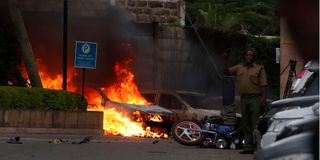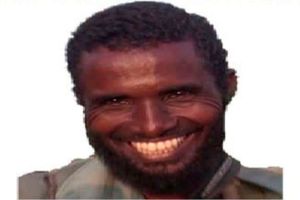
President William Ruto.
The 2019 DusitD2 terror attack in Nairobi, in which 21 people were killed, was financed through banks in South Africa, Somalia and Kenya, President William Ruto has revealed.
The president made the disclosure as he stressed the complex nature of transnational organised crimes. “Financing, facilitation, and commission are trans boundary in nature. For instance, during the Dusit terror attack, financing was traced to a bank in South Africa, various banks within Kenya, and Somalia,” he said during the 23rd Commonwealth Heads of Prosecuting Agencies Conference in Mombasa.

Scenes from Dusit hotel that was attacked by terrorists on January 15, 2019.
The attack, which occurred on January 15, 2019, saw five al-Shabaab militants launch a coordinated assault involving gunfire and explosions at the DusitD2 hotel complex in Riverside.
The attackers first detonated a car bomb before storming the premises and targeting civilians and office workers. By the end of the attack, 21 people — both Kenyans and foreign nationals — had been killed, and over 30 others injured, some critically. All five attackers were killed by security forces.
President Ruto said that a deep analysis of terror incidents in Kenya revealed that criminal networks operate across multiple jurisdictions and use modern tools, including social media platforms.
“Terrorism is one of the most dangerous forms of transnational organised crime, which continues to pose a persistent and evolving threat to national security,” he added.
Dr Ruto reflected on Kenya’s experience with terrorism, recalling past devastating attacks including the 1998 United States Embassy bombing in Nairobi, the 2013 Westgate Mall siege, the 2015 Garissa University massacre, and the 2019 DusitD2 complex attack.
Despite these challenges, the President noted that Kenya had made significant progress in counter-terrorism efforts through heightened vigilance, enhanced intelligence gathering, and strengthened international cooperation.
Just last month, two individuals were convicted for aiding the DusitD2 attackers, with their sentencing set for June 19, 2025. Similarly, in the Garissa University case, three individuals were convicted in 2019 and sentenced to life imprisonment and 41 years each.

Three suspects of the Dusit D2 terror attack at the Milimani law courts on February 28, 2019.
Dr Ruto provided further insight into the current state of terror-related prosecutions, stating that 24 terrorism-related cases remain active before the courts, majority involving membership in international terrorist organisations.
“These efforts have not only led to successful prosecutions but have also significantly suppressed such attacks and contributed to enhanced national security,” he said.
Beyond terrorism, the President pointed out that between 2021 and 2024, a total of 720 cases involving transnational crimes such as trafficking in children and other persons, unlawful acquisition of travel documents, fraud and misrepresentation, and facilitating illegal entry into or exit from the country, were reported. He also said that the Office of the Director of Public Prosecutions (ODPP) had registered 30 money laundering cases in the past three years.
“All of us in this room are alive to the undeniable fact that we live in a world where the threat of transnational organised crime continues to grow in scale and complexity,” Dr Ruto said.
The President added that money laundering, terrorism, terrorism financing and human trafficking pose serious and escalating risks to not only Kenya but also the global community. Perpetrators of such crimes operate across borders, moving illicit goods and people through shadowy networks, laundering money through offshore systems and smuggling narcotics across nations.
“We therefore need greater vigilance, more robust partnerships, and integrated international responses to identify, investigate, and prosecute those behind these crimes. It is through such collaboration between national, regional, and international agencies that we can effectively disrupt and neutralise these threats and blunt their negative impact,” he said.
The President also highlighted how criminal networks have evolved, often having terrorists pose as victims to cross borders, operating through encrypted social media platforms and increasingly using cryptocurrency to finance their activities. “These cases underscore the scale and complexity of the threat we face and the urgency of sustained and coordinated action,” he said.

Special forces arrive at the scene of an explosion at the Dusit D2 hotel complex in Nairobi on January 15, 2019.
He praised the conference’s theme, “Building Partnerships through International Cooperation in the Fight Against Money Laundering, Terrorism, Terrorism Financing, and Transnational Organised Crime”, as timely, stating that it reflects the critical need for prosecutorial agencies to develop regional and international mechanisms to collaboratively address emerging threats.
Dr Ruto emphasised the importance of joint investigations, mutual legal assistance, and extradition in enabling real-time cross-border collaboration and information sharing.
He noted that Kenya’s ODPP had signed a Memoranda of Understanding with prosecutorial agencies in Azerbaijan, Morocco, Qatar, and Saudi Arabia to enhance cooperation in fighting terrorism and organised crime. “We must also work towards the harmonisation of our legal frameworks. Aligning national laws across jurisdictions is essential to building a truly global front against transnational organised crime,” he urged.
The President also stressed the importance of asset tracing, confiscation, and forfeiture in denying criminal organisations the fruits of their operations. “Denying criminal enterprises the proceeds of their illicit activities is key to undermining their operations. I challenge the heads of prosecuting agencies here to give priority to this particular endeavour,” he said.
He pledged the government’s commitment to enhancing resources and the capacity of the ODPP to lead efforts against organised crime both regionally and internationally. “Importantly, the revamping of our anti-money laundering and asset forfeiture framework is a testament to our commitment. It reflects our pursuit of greater specialisation, stronger institutions, and high-quality investigations,” the President said.

Dusit D2 hotel terror attack on January 15, 2019.
He underscored Kenya’s commitment to the rule of law and a human rights-centred approach to justice, noting that the conference provided a valuable platform for sharing experiences and innovative solutions.
President Ruto also highlighted the role of technology in governance and criminal justice by encouraging prosecutors and the DPPs in the Commonwealth countries to leverage on technology, especially when tackling transboundary crimes. “The era of (Artificial Intelligence (AI) is here… it comes both as a threat and much more importantly as an asset… to better manage global governance,” he stated, encouraging the use of AI to improve prosecution efficiency an justice delivery.
He also encouraged greater collaboration within the East African Community and the African Union, noting that governance, criminal justice, and prosecutions should not be left behind as the continent builds regional networks.
Persecutors and heads of prosecutions led by Kenya’s DPP Renson Ingonga have been at the Sarova Whitessands Hotel in Mombasa for the past three days for their 23rd Commonwealth Conference.









